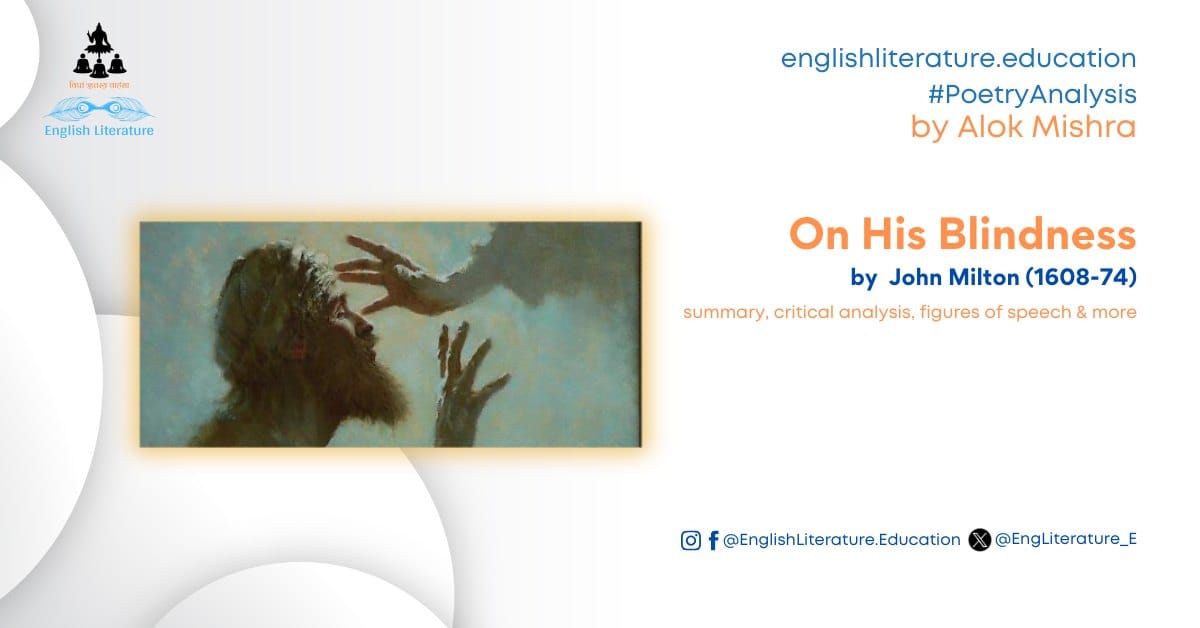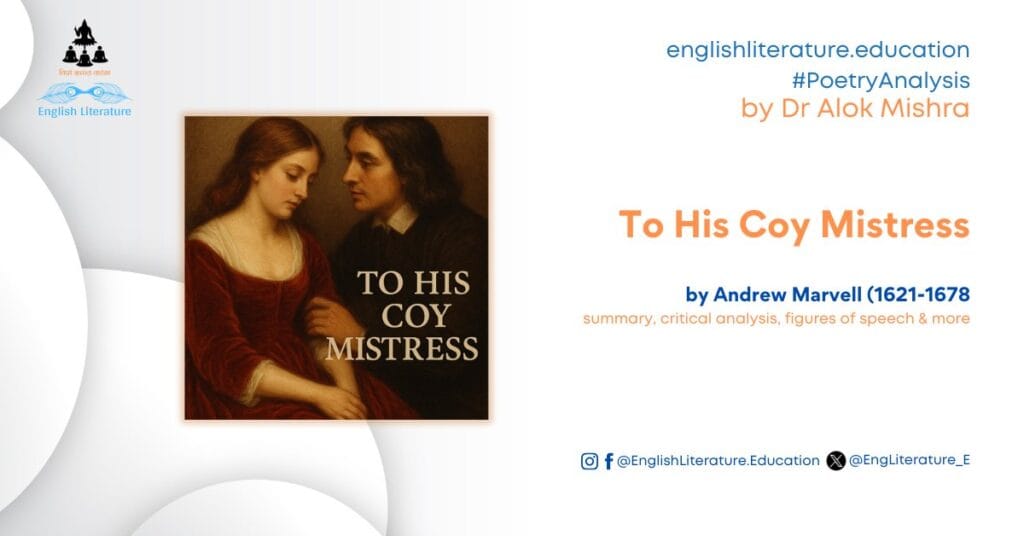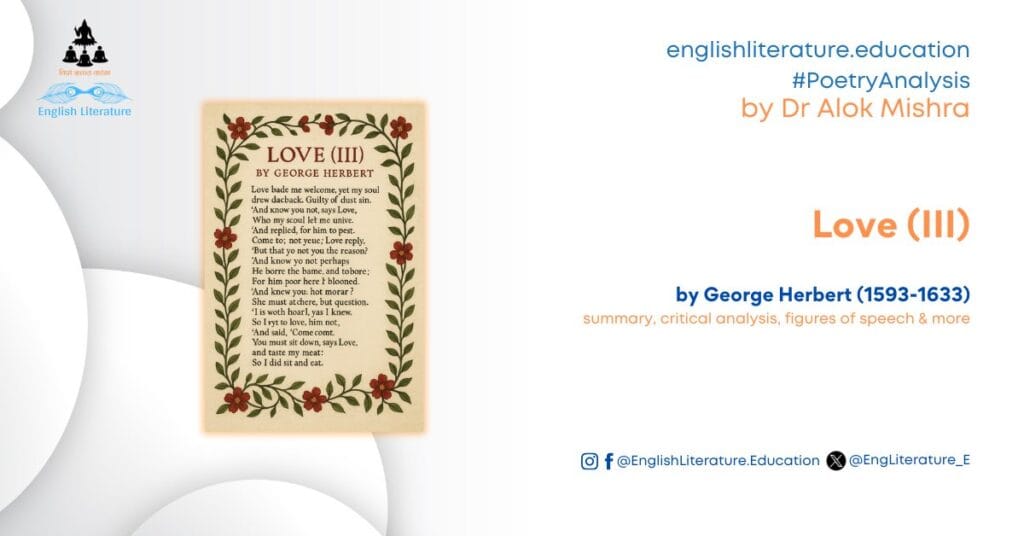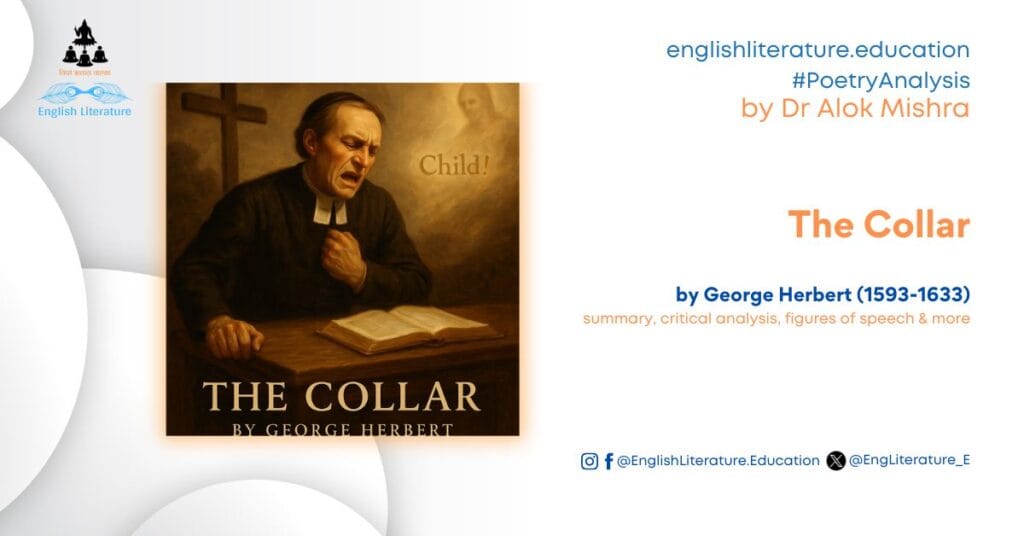John Milton’s place in English literature is unparalleled. The sheer length of Paradise Lost, for starters, can outshine the poetic oeuvre of many English poets. Born in 1608, a vowed protestant for his life, John Milton composed many poems defending the Christian faith. On His Blindness is also one of those poems. Prescribed in the English literature syllabi of many schools and universities, this poem, a sonnet in the typical Miltonic style, discusses faith and life in a nutshell. In this article, you will read a critical analysis of this famous poem, including a quick summary, an extensive discussion on figures of speech and a comprehensive literary commentary. Read the article to the end to understand all the aspects.
John Milton’s On His Blindness: A Meditation on Faith, Patience, and Divine Will
John Milton’s On His Blindness (also known as When I Consider How My Light Is Spent) is a profound Petrarchan sonnet that grapples with the poet’s struggle to reconcile his loss of sight with his spiritual duty. This poem, written in the mid-17th century, exemplifies Milton’s mastery of theological introspection, poetic form, and classical allusion. Through its compact yet deeply layered structure, the poem explores themes of divine justice, human frailty, and the true meaning of service to God. This analysis will examine the poem’s historical context, thematic depth, and literary brilliance, offering English literature students a comprehensive understanding of Milton’s enduring work.
Publication and Background
Composed: Likely between 1652 and 1655 (after Milton’s total blindness)
Published: 1673 (in Poems, &c. Upon Several Occasions)
Form: Petrarchan sonnet (14 lines, octave-sestet structure, ABBA ABBA CDE CDE rhyme scheme)
Theme: Divine will, human suffering, and the virtue of patience
Milton began losing sight in the early 1650s and was completely blind by 1652. This sonnet reflects his anguish over his inability to continue his literary and political work, which he saw as a God-given talent. The poem’s title, On His Blindness, was not given by Milton but added later by editors—its original opening line serves as its identifier. The poem is intensely autobiographical, yet its universal themes elevate it beyond personal lament into a meditation on faith and submission to divine providence.
Quick Summary of On His Blindness
John Milton’s On His Blindness is a deeply introspective sonnet that captures the poet’s spiritual crisis following his loss of sight. The poem opens with a lament—Milton reflects on how his “light” (a metaphor for both his vision and his life’s vitality) has been extinguished “ere half my days,” plunging him into a “dark world and wide.” This premature darkness symbolises not only physical blindness but also an existential despair, as he feels his God-given talent (his poetic genius, alluding to the Biblical Parable of the Talents) lies “useless” within him. Tormented by the fear of failing his divine calling, Milton questions whether God could demand productive labour from someone deprived of the means to work: “Doth God exact day-labour, light denied?” This agonised inquiry reveals his struggle with Puritan ideals of duty and productivity and his guilt over perceived idleness. The octave thus immerses the reader in Milton’s turmoil, blending personal anguish with theological doubt.
The sestet, however, marks a dramatic shift with the intervention of “Patience,” a personified virtue that quells Milton’s despair. Patience’s reply—“God doth not need / Either man’s work or his own gifts”—redefines the nature of divine service, asserting that God’s omnipotence renders human toil secondary to heartfelt submission. The poem’s central paradox emerges here: accurate service lies not in grand achievements but in bearing God’s “mild yoke” with quiet resilience. Milton’s imagery of celestial servants who “speed / And post o’er Land and Ocean without rest” contrasts sharply with the concluding line—“They also serve who only stand and wait”—elevating patient endurance to the level of active labour. This resolution transforms the sonnet from a cry of anguish into a meditation on humility, trust, and the inscrutable wisdom of divine will. The final lines, often quoted as a testament to faith in adversity, encapsulate Milton’s hard-won acceptance that spiritual worth is measured not by outward deeds but by inward surrender to God’s plan.
Text of the Poem
Line by Line Explanation and Critical Commentary
Lines 1–4:
“When I consider how my light is spent,
Ere half my days, in this dark world and wide,
And that one Talent which is death to hide
Lodged with me useless, though my Soul more bent”
Explanation:
The poem opens with Milton’s anguished reflection on his blindness (“how my light is spent”), which struck him prematurely (“ere half my days”). The “dark world and wide” conveys physical darkness and existential desolation. The “Talent” (a Biblical allusion to Matthew 25:14-30) symbolises his poetic gift, which he fears is now “useless” due to his inability to write. The phrase “death to hide” underscores the gravity of failing to use God-given gifts, while “my Soul more bent” reveals his desperate desire to serve despite his limitations.
Critical Commentary:
Milton’s despair here is twofold: personal (his blindness) and theological (his fear of divine judgment). The juxtaposition of “light” and “dark” frames his crisis in cosmic terms, while the “Talent” metaphor elevates his struggle from personal loss to a spiritual test. The tension between his “useless” state and his soul’s yearning to serve introduces the poem’s central conflict: Can one still fulfil God’s will when physically incapacitated?
Poetic Devices:
Metaphor: “Light” for vision/life; “Talent” for poetic ability.
Allusion: The Parable of the Talents (Matthew 25), where servants are punished for hiding their gifts.
Diction: “Spent” suggests exhaustion; “dark world and wide” amplifies isolation.
Comparison with Other Poets:
Like George Herbert’s The Collar, where the speaker rails against divine constraints before submitting, Milton’s opening lines dramatise a struggle with faith. However, Herbert’s tone is more rebellious, while Milton’s is despairing. Donne’s Holy Sonnet 14 (“Batter my heart”) also parallels this tension between human frailty and divine demand, though Donne’s imagery is more violent.
Lines 5–8:
“To serve therewith my Maker, and present
My true account, lest he returning chide;
‘Doth God exact day-labour, light denied?’
I fondly ask. But patience, to prevent”
Explanation:
Milton’s anxiety escalates as he imagines God as a strict master demanding a “true account” of his labour. The rhetorical question“Doth God exact day-labour, light denied?” reveals his fear that God’s justice might be harsh, even cruel. The word “fondly” (foolishly) hints at his self-awareness that this doubt is misguided. The octave concludes with “patience” interrupting his “murmur,” foreshadowing the sestet’s resolution.
Critical Commentary:
These lines expose Milton’s Puritan guilt, where productivity is tied to salvation. The accounting metaphor (“true account”) casts God as a divine auditor, reflecting 17th-century anxieties about predestination. The volta is subtly prepared here, as “patience” begins to “prevent” his despair, signalling the poem’s impending shift from doubt to acceptance.
Poetic Devices:
Rhetorical Question: Challenges divine justice, revealing Milton’s turmoil.
Personification: Patience as an active intercessor.
Enjambment: The flow between lines 7–8 mimics the speaker’s spiralling thoughts.
Comparison with Other Poets:
Blake’s The Tyger similarly questions divine justice (“Did he who made the Lamb make thee?”). Milton’s query, however, is introspective, not accusatory. Herbert’s The Pulley also explores divine-human tension, though Herbert resolves it gracefully, while Milton turns to patience.
Lines 9–12:
“That murmur, soon replies, ‘God doth not need
Either man’s work or his own gifts; who best
Bear his mild yoke, they serve him best. His state
Is Kingly.”
Explanation:
Patience’s reply reframes Milton’s understanding of service: God’s omnipotence means He “doth not need” human labour. The “mild yoke” (an allusion to Christ’s words in Matthew 11:30) suggests that submission, not productivity, is the accurate measure of devotion. “His state / Is Kingly” emphasises God’s sovereignty, rendering human efforts secondary to His will.
Critical Commentary:
This is the poem’s theological core. Milton replaces Puritan rigour with a softer, almost Anglican emphasis on grace. The “yoke” metaphor transforms suffering into a shared burden with Christ, while “Kingly” reassures Milton of God’s benevolent authority. The shift from doubt to trust mirrors Job’s submission (“Though he slay me, yet will I trust him”).
Poetic Devices:
Allusion: “Mild yoke” (Matthew 11:30) reframes suffering as sacred.
Tone Shift: From despair to calm assurance.
Paradox: Strength in surrender (“who best / Bear his yoke… serve him best”).
Comparison with Other Poets:
Hopkins’ Carrion Comfort (“I can no more. I can; / Can something, hope”) also wrestles with divine service amid suffering, but his resolution is more turbulent. Donne’s Batter my heart seeks forceful submission, while Milton’s is quiet.
Lines 13–14 (Couplet):
“Thousands at his bidding speed
And post o’er Land and Ocean without rest:
They also serve who only stand and wait.”
Explanation:
The closing lines contrast active servants (“speed / And post”) with those who “stand and wait.” Milton resolves his crisis by asserting that passive endurance (his patient acceptance of blindness) is equally valid service. The final line, often quoted as a maxim, encapsulates the poem’s wisdom.
Critical Commentary:
The couplet’s balance between motion (“speed,” “post”) and stillness (“stand and wait”) mirrors Milton’s reconciliation of action and patience. The oceanic imagery evokes vast divine labour, dwarfing human efforts, while “stand and wait” elevates Milton’s passive role to dignity. This conclusion aligns with Pauline theology (“Be still, and know that I am God”).
Poetic Devices:
Imagery: “Land and Ocean” symbolises the scope of divine will.
Antithesis: Active vs. passive service.
Finality: The couplet’s declarative tone closes the argument.
Comparison with Other Poets:
Shakespeare’s Sonnet 116 (“Love is not love / Which alters when it alteration finds”) similarly ends with a definitive moral, but Milton’s is more introspective. Herbert’s Love (III) also concludes with serene submission through dialogue rather than epigram.
Final Notes on Poetic Prowess:
Milton’s sonnet masterfully condenses theological debate into 14 lines. Its Petrarchan structure (problem in octave, resolution in sestet) mirrors the soul’s journey from doubt to faith. Biblical allusions universalise his personal struggle, while metaphors (“light,” “yoke”) blend physical and spiritual realms. The poem’s enduring power lies in its balance of intellectual rigour and emotional honesty—a hallmark of Milton’s genius.
Some Literary Conjecture and Notes:
Theological Continuity: From On His Blindness to Paradise Lost
Milton’s On His Blindness serves as a microcosm of the theodicy—the justification of God’s ways—that he would later expand into the epic Paradise Lost. In the sonnet, the speaker’s crisis hinges on the apparent injustice of his blindness (“Doth God exact day-labour, light denied?”), mirroring the broader human struggle to reconcile suffering with divine goodness. Patience’s reply (“God doth not need / Either man’s work or his own gifts”) echoes the core message of Paradise Lost, where God’s providence operates beyond human comprehension. The “mild yoke” of submission in the sonnet prefigures Adam’s hard-won realisation in Book XII of Paradise Lost: “To suffer, as to do, / His strength is made perfect in weakness.” Both works assert that true service lies not in grand deeds but in humble acceptance of God’s inscrutable will, transforming passive endurance into an active virtue. The sonnet’s closing line—“They also serve who only stand and wait”—finds its epic counterpart in Michael’s instruction to Adam: “Only add / Deeds to thy knowledge answerable; add faith, / Add virtue, patience, temperance, add love.” Here, Milton’s anguish over blindness becomes a universal lesson in faith, bridging the intimate sonnet and the cosmic epic.
Comparative Perspective: Milton and Borges on Blindness
Where Milton’s On His Blindness frames blindness as a divine test requiring patient submission, Jorge Luis Borges’ A Blind Man (from El Hacedor) embraces it as a creative catalyst. Milton’s speaker fears his “Talent” is “useless” without sight, but Borges, who also went blind in middle age, writes: “I am not blind in dreams.” For Borges, darkness becomes a realm of infinite literary possibility, where “the stars and all the ancient heavens” reside within. While Milton justifies God’s ways through theological obedience, Borges transcends physical limitation through imagination, suggesting that blindness unveils new modes of vision. Yet both poets share a defiance: Milton’s “stand and wait” is not passive resignation but active vigilance, much like Borges’ insistence that “the world is a parable” to be decoded by the inner eye. Where Milton finds purpose in divine will, Borges finds it in artistic reinvention—two responses to darkness, one devotional, the other existential, but both affirming the resilience of the human spirit.
Key Takeaway for Students
Milton’s sonnet is a personal lament and a theological cornerstone that anticipates his later works. Comparing it to Paradise Lost reveals his lifelong preoccupation with justifying divine justice; contrasting it with Borges reveals how blindness can be framed as either a trial or a liberation. These connections illuminate the poem’s enduring relevance: a meditation on how humans negotiate suffering, purpose, and the unseen hand of providence.
Comprehensive Critical Commentary on Milton’s On His Blindness
John Milton’s On His Blindness is a profoundly personal yet theologically rigorous sonnet reflecting his unwavering Protestant convictions and intimate engagement with Christian doctrine. As a staunch Puritan, Milton believed in the sovereignty of God and the necessity of aligning human will with divine purpose, themes that permeate this poem. The opening lament—“When I consider how my light is spent”—reveals not just personal despair but a profound theological anxiety rooted in the Calvinist emphasis on predestination and the “Parable of the Talents” (Matthew 25:14–30). Milton’s fear that his blindness renders his God-given talent “useless” underscores the Puritan work ethic, which equated idleness with moral failure. Yet the poem’s volta, where Patience intervenes, shifts the focus from human effort to divine grace, encapsulating the Protestant tenet that salvation is not earned through works but through faith and submission. The phrase “who best / Bear his mild yoke” echoes Christ’s words in Matthew 11:30, reinforcing Milton’s belief in the transformative power of humble obedience. This theological framework aligns with Milton’s broader political and religious views, which rejected the ceremonial excesses of Anglicanism and Catholicism in favour of a simpler, more direct relationship with God. The poem, therefore, is not merely a meditation on physical suffering but a manifesto of Milton’s Protestant worldview, where divine justice is ultimately merciful and human agency is secondary to God’s omnipotent will.
Critically, On His Blindness also reflects Milton’s intellectual engagement with theodicy—the justification of God’s ways to humanity—a theme he would later expand in Paradise Lost. The poem’s resolution, “They also serve who only stand and wait,” is a radical redefinition of service that challenges the Puritan valorisation of visible labour. Here, Milton subverts contemporary religious expectations by asserting that passive endurance can be as spiritually significant as active achievement. This idea resonates with his later portrayal of Adam and Eve’s expulsion from Eden, where obedience and patience are framed as the highest virtues. Moreover, the poem’s Petrarchan structure—its octave of doubt and sestet of resolution—mirrors the Protestant journey from spiritual crisis to assurance of grace, a narrative arc central to Reformed theology. Milton’s use of Biblical allusions and metaphors (“light,” “yoke,” “day-labour”) not only anchors the poem in Christian tradition but also demonstrates his mastery of synthesising personal experience with universal theological truths. In this light, On His Blindness is a microcosm of Milton’s lifelong project: to reconcile human suffering with divine justice, all while upholding the Protestant ideals of faith, humility, and the supremacy of God’s will. The poem’s enduring power lies in its ability to transform personal anguish into a timeless meditation on the nature of service and the inscrutable wisdom of Providence.
Thank you for reading! If you have any questions, opinions, or anything else to say, please write them in the comment box. I will respond to as many as I can.
Alok Mishra
…





2 Comments. Leave new
Thank you for this critical analysis and commentary. I used it in my class “Survey of English and American Literature” to aid my students’ interest and understanding of Milton’s Sonnet. I hope that through it, they will also develop an appreciation of literature and Milton’s Sonnet 19, regardless of the diversity in faith that is present in my class.
Thanks for helping me out. I read many other explanatioons and summaries but none helped as this one. This is detailed and focused. Please write more on the poems in CBSE syllabus. Thank you so much.